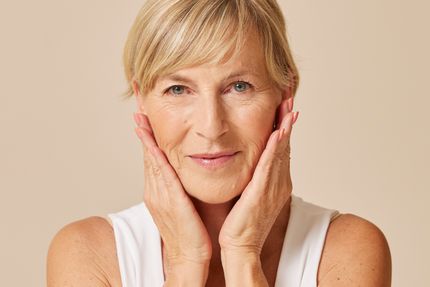Sleep problems and menopause
The chemistry of sleep is a hormonal process. No wonder many women experience sleep problems when menopause hits (or before). Sleep difficulties are common, both in perimenopause and postmenopause. Almost 50 percent of women in perimenopause report sleep problems, and this percentage rises to 60 in postmenopause. What should you do (or not do) to improve sleep?

I used to sleep like a log. Since menopause, I wake up multiple times a night and can’t get out of bed in the morning. - Sylvia (age 53)

What is happening in your body?
Sleep is a hormonal process, just like the menopausal transition. During perimenopause, your hormones start to fluctuate and then decline. This can affect the quality of your sleep. You may start having trouble falling asleep, feel restless at night, wake up at night and be unable to go back to sleep, or wake up very early in the morning. The relationship between progesterone and the stress hormone cortisol plays an important role in this respect.
Known as the ‘relaxing hormone’, progesterone has a calming, mildly sedative effect. Like other reproductive hormones, progesterone levels decrease as you age and enter menopause. This can make it more difficult to fall asleep or stay asleep at night. Low progesterone can also affect the airways and cause disrupted breathing (sleep apnoea). Your blood oxygen levels can drop when you stop breathing, causing you to wake up.
In addition, menopausal women often have low cortisol levels during the day (causing daytime fatigue) and elevated cortisol levels at night (causing difficulty with falling asleep). Cortisol is the enemy of a ‘sleep hormone’ called melatonin. Being under a lot of stress or going through a hectic time interferes with melatonin production. This can cause sleep problems or even insomnia, a condition where you try your best to sleep but are unable to.
To make matters worse, when hormone levels drop during menopause, the levels of serotonin (the ‘happiness hormone’) also fall, which can trigger mood swings and depressive symptoms. Serotonin is converted into melatonin when it’s dark outside. Lower serotonin levels means less melatonin is produced which causes you not to sleep as well.
What are the effects of lack of sleep?
Sleep is important for many aspects of your health. It ensures that hormones and neurotransmitters can function properly, but also that you feel focused, happy and resilient. In fact, you can start to feel the effects of sleep deprivation after not getting enough sleep for just one night. You may feel gloomy or low, or find yourself more irritable than usual. Sleep deprivation can also negatively impact your energy level, mood, and in some cases, your sex drive. Lack of sleep may also affect appetite-regulating hormones, which can lead to an increased appetite.
Does this mean you have to suffer needlessly? Of course not! By taking care of yourself, making minor lifestyle adjustments and prioritising good sleep hygiene, you'll see that it’s possible to improve your sleep. If you need a little extra help to get a good night's sleep, you can also consider trying supplements.
What can you do?
Poor sleep or insomnia can also be caused by other factors or menopausal symptoms. For instance, nocturnal hot flashes, stress, insufficient physical activity or lack of exposure to sunlight.
To get a good night's rest, you need to lower your cortisol levels. This means you need to get your circadian rhythm, your daily cycle of sleep and wakefulness, back in balance. Some tips to get you back on track:
- Expose yourself to natural sunlight in the morning: go outside no later than one hour after you wake up.
- No alcohol and no coffee after noon.
- Avoid exposure to blue-light screens (e.g., mobile phones, tablets, laptops) in the evening.
- Dim lights in the evening.
- Be physically active: exercise promotes sleep, but do it in the morning or during the day. You don't want your body temperature to rise too much before bedtime.
- Take magnesium or saffron supplements.
Hormone therapy for sleep problems
Hormone replacement therapy (HRT) replaces lost hormones (oestrogen and progesterone) to counteract the effects of menopause. HRT can benefit sleep in women who have vasomotor symptoms (i.e., night sweats and hot flashes), especially when the vasomotor symptoms are causing the sleep disturbance. There are many different types of HRT available. Options include Elleste Solo tablets, Estraderm MX patches and Oestrogel.

Thanks to HRT, my night sweats are a thing of the past. I sleep like a baby every night. – Anna (age 48)

Sources
- Kravitz HM, Janssen I, Bromberger JT, Matthews KA, Hall MH, Ruppert K, Joffe H. (2017). Sleep Trajectories Before and After the Final Menstrual Period in The Study of Women's Health Across the Nation (SWAN). PMID: 28944165.
- Leslie M. Swanson, Michelle M. Hood, Martica H. Hall, Nancy E. Avis, Hadine Joffe, Alicia Colvin, Kristine Ruppert, Howard M. Kravitz, Genevieve Neal-Perry,Carol A. Derby, Rachel Hess, Siobán D. Harlow. National Sleep Foundation. (2022). Sleep timing, sleep regularity, and psychological health in early late life women: Findings from the Study of Women's Health Across the Nation (SWAN). https://www.sleephealthjournal.org/article/S2352-7218(22)00223-6/abstract.
- Pace-Schott EF, Spencer RM. (2011). Age-related changes in the cognitive function of sleep. PMID: 21741545.
- International Menopause Society. Menopause & Insomnia. https://www.menopauseinfo.org/wp-content/uploads/2023/09/IMS-Factsheet-11-sleep.pdf
- Caufriez A, Leproult R, L'Hermite-Balériaux M, Kerkhofs M, Copinschi G. (2011). Progesterone prevents sleep disturbances and modulates GH, TSH, and melatonin secretion in postmenopausal women. PMID: 21289261.
- Tandon VR, Sharma S, Mahajan A, Mahajan A, Tandon A. (2022). Menopause and Sleep Disorders. PMID: 35707298.
- Lopresti AL, Smith SJ, Drummond PD. (2021). An investigation into an evening intake of a saffron extract (affron®) on sleep quality, cortisol, and melatonin concentrations in adults with poor sleep: a randomised, double-blind, placebo-controlled, multi-dose study. https://www.sciencedirect.com
Your path to a smooth menopause starts here
Get the tools you need to navigate menopause with more ease and to educate yourself about your body. With tips and insights from experts, and relatable stories of women just like you. Press play, not pause.
Tips and advice


FAQ
Why am I unable to stay asleep?
Progesterone has a mildly sedative effect. When progesterone levels drop during the transition into menopause, this can make it harder for you to fall asleep or stay asleep at night. It can also affect the airways and cause disrupted breathing (sleep apnoea). Your blood oxygen levels can drop when you stop breathing, causing you to wake up. In addition, most menopausal women also have higher cortisol levels. Cortisol inhibits the production of melatonin (the sleep hormone), which makes it more difficult to fall asleep or stay asleep.











